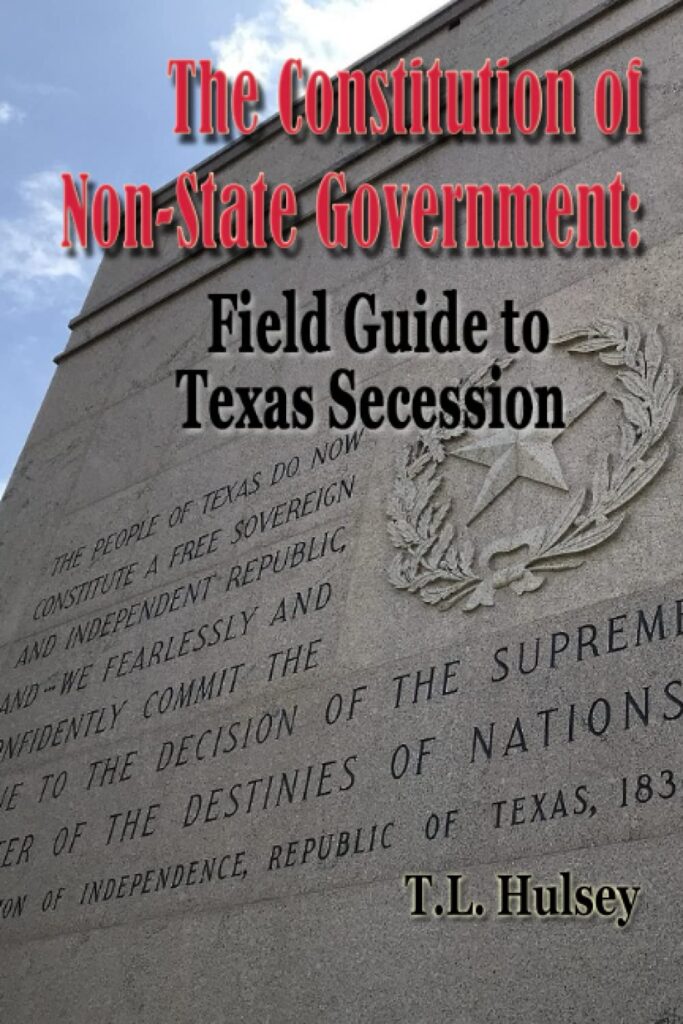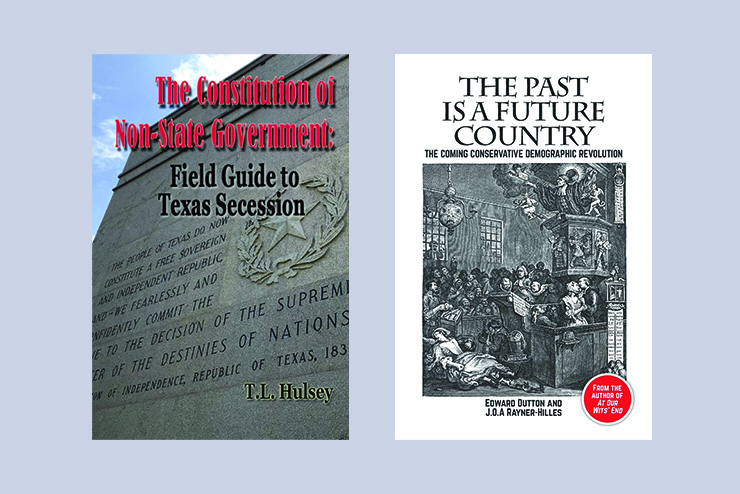
The Constitution of Non-State Government: Field Guide to Texas Secession, by T. L. Hulsey (Shotwell Publishing; 271 pp., $22.00). If T. L. Hulsey is correct, the only way to counteract the escalating madness of American life is to recover local sovereignty—through secession from the United States. Where mainstream political scientists equate secession with treason, Hulsey sees it as “the freedom of association writ large,” and therefore “the only peaceful arbiter of intractable political disputes between large societies.” The deep state and its hostility toward ordinary Americans is a feature rather than a bug of the U.S. federal regime, Hulsey explains, so instead of attempting to clean up or control the Beltway, Americans should instead work to disconnect themselves from it.
Hulsey not only looks sympathetically at the rationale of the losing side of the War Between the States, he also examines the history of successful secession movements, such as those of Norway from Sweden, of Singapore from Malaysia, of Bangladesh from Pakistan, and of Ukraine from the former Soviet Union. Such examples suggest that secession is hardly a synonym for catastrophe. Indeed, Hulsey shows how Biafra’s failure to achieve secession led to the massacre of a million independence-minded Nigerian Christians by their predominantly Muslim government.
Unfortunately, Hulsey’s text is at times obscure. “Architectonics modifies the symbiotic communitarianism of Johannes Althusius in order to redefine it as a category of praxeology,” he writes. And the Christian reader will undoubtedly raise his eyebrow at Hulsey’s gratuitous and unorthodox excursus into theological questions.
The author stands on firmer ground when arguing convincingly that opponents of left-wing fanaticism must learn and utilize states’ rights measures, while reserving the threat of full secession as a deterrent to federal overreach. Just as gun owners have kept the Second Amendment alive, a critical mass of serious states rights advocates might pressure the federal government into respecting the Tenth.
Yet, as Hulsey realizes, the coastal elites are more likely to harden their hearts than to allow Middle Americans to separate in peace. Nor can any help be expected from establishment conservatives, who will only surrender their unitary understanding of America when forced to by events. This dangerously dysfunctional political arrangement only makes it more urgent to prepare for a breakup. It may not be a matter of seceding, but of system collapse.
(Jerry Salyer)

The Past Is a Future Country: The Coming Conservative Demographic Revolution, by Edward Dutton and J.O.A. Rayner-Hilles (Societas; 250 pp., $29.90). This book predicts a conservative resurgence based on demographic change after civilizational collapse.
Borrowing from the five “moral foundations” proposed by Jonathan Haidt in The Righteous Mind (2012), Dutton and Rayner-Hilles posit that balancing these moral foundations has caused human societies of the past century to operate in cycles of liberalism and conservatism. Today, there is an imbalance favoring individualist personalities, which score high in “care” and “fairness,” but low in “authority,” “loyalty,” and “sanctity.” A fixation in the minds of individualists, especially on fairness at the expense of other important virtues, generates dogmatic intolerance and propels cultures leftward, leading to waning traditional religiosity, mass immigration, polarization caused by liberalism, and overburdened social welfare systems.
The authors compare our time in light of the rise and fall of prior civilizations. However, they warn against leaning too heavily on classical comparisons. Each civilization develops differently, making it difficult to pinpoint precise commonalities. Precision is further hampered by historically unique circumstances. Our current Western civilization easily surpasses antiquity in terms of the rate of major innovations introduced. While increasing the size, health, and longevity of populations, these innovations have also created a brittle situation: a staggering majority of Western populations rely for their survival on the continuation of current living standards.
The destabilizing forces of individualism will cause these living standards to decline, the cyclical pattern of liberal and conservative struggle to cease, and the dark age to arrive. The survivors of the authors’ predicted Malthusian collapse will share certain genetic traits that favor conservative values. Delving here into the realm of genetics, the authors argue that there is a nexus between biology and political ideology, and that evolutionary pressures shape predispositions toward certain political orientations. Crucially, this helps to demystify the psychological differences between conservatism and leftism, especially when evaluated on the basis of adherence to group values.
For right-wingers, the authors’ view of the sociopolitical landscape is a deferred tonic for despair. The verdict is already sealed; the left will capitulate from self-inflicted wounds. There is no urgency to push for sweeping changes. The only uncertainty is how soon this fate will materialize.
(Edward Stawiarski)

Leave a Reply